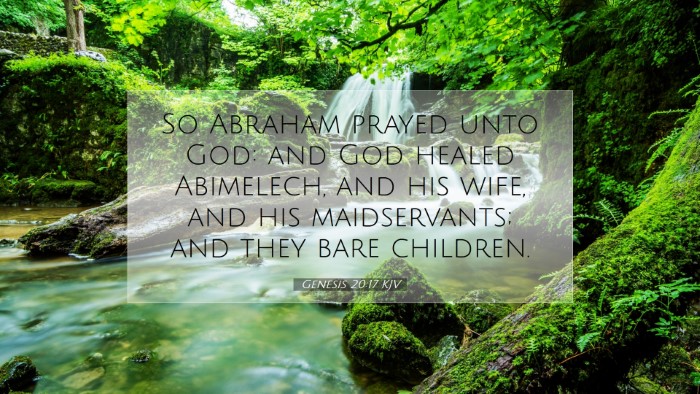Bible Commentary on Genesis 20:17
Verse Context: Genesis 20:17 reads, "So Abraham prayed unto God: and God healed Abimelech, and his wife, and his maidservants; and they bare children." This verse occurs in a narrative where Abraham, fearing for his life, misrepresents Sarah as his sister, leading to a grave consequence for King Abimelech.
Summary of Key Themes
- The Power of Prayer: Abraham's intercession demonstrates the potency of prayer. It reveals God’s willingness to respond to the prayers of the righteous, even in complicated situations.
- Divine Healing: God's healing represents His sovereignty and mercy. It indicates that God has the authority to restore and rejuvenate lives, even after an act of disobedience.
- God's Covenantal Faithfulness: This incident emphasizes God's covenant with Abraham, highlighting that God’s promises endure beyond human failures and misunderstandings.
Commentary Insights
Matthew Henry on Genesis 20:17
Matthew Henry elucidates the significance of Abraham's prayer, emphasizing that it is both an act of obedience to God's command and a demonstration of Abraham's role as a prophet. Henry notes that prayer is not merely a formality but a heartfelt plea for divine intervention. His commentary underscores how God's response to Abraham's prayer not only addressed Abimelech's plight but also reaffirmed God's promises to Abraham and his lineage, showcasing the broader implications of human actions on divine purposes.
Albert Barnes’ Perspective
Albert Barnes offers a thorough exploration of the narrative, focusing on the moral implications of Abraham's actions and the subsequent healing of Abimelech and his household. Barnes highlights that prayer manifests a believer's reliance on God, and in this instance, Abraham's faith was pivotal in reversing the curse placed upon Abimelech. He suggests that the narrative illustrates God's protective grace for those who may be innocently caught up in the consequences of another's sin, urging readers to recognize God's justice intertwined with His mercy.
Adam Clarke’s Insights
According to Adam Clarke, the act of Abraham praying serves as a primary lesson on the power of intercession. Clarke points out that God’s healing was contingent upon Abraham’s prayer, highlighting that prayer can change circumstances and bring about healing when invoking God's name. He also explores the theological implications of God’s intervention, positing that this incident reveals God's attributes—His readiness to forgive, His power to heal, and His overarching sovereignty over creation, emphasizing that God is attentive to the pleas of His servants.
Theological Implications
- Intercession: Abraham's role as an intercessor illustrates that the faithful can stand in the gap for others. This role is significant within ministry, as it underscores the call for church leaders and believers to pray on behalf of those who are suffering or facing trials.
- God’s Sovereignty and Mercy: The account vividly portrays the tension between God's justice and mercy. While sin leads to consequences, God actively engages with humanity to provide redemption and healing.
- Covenantal Relationships: This narrative reinforces the ongoing theme of God’s covenant with Abraham. It signifies that God's promises to His people persist regardless of their shortcomings, providing hope for future generations.
Practical Applications
- Encouragement to Pray: Believers and church leaders are reminded to be diligent in prayer for others, recognizing the potential impact of their intercessions on both individual lives and communities.
- Understanding Consequences: This passage serves as a reminder that our actions can have profound effects on others, prompting self-examination and a commitment to live righteously.
- Faith in God’s Healing: Just as God healed Abimelech, the church is called to trust in God's ability to heal and restore those who are suffering today.
Conclusion
Genesis 20:17 encapsulates a profound and multifaceted truth about God’s interaction with humanity, underscoring themes of intercession, healing, and covenant. Through the insights drawn from the commentaries of Henry, Barnes, and Clarke, readers are encouraged to delve deeper into the relational dynamics between God and His people while embodying the call to live faithfully and prayerfully in a world often marred by sin and misunderstanding.


